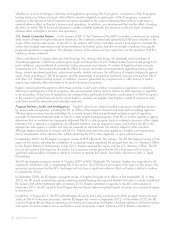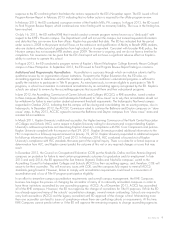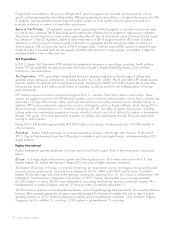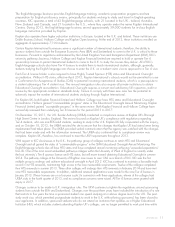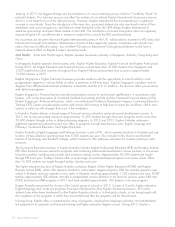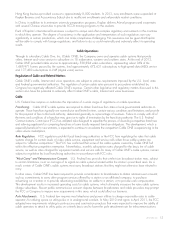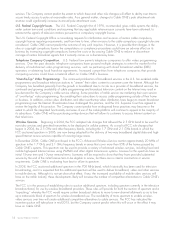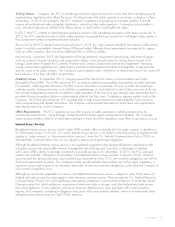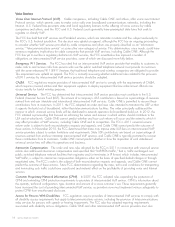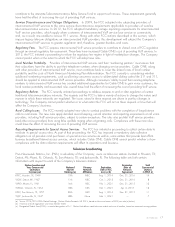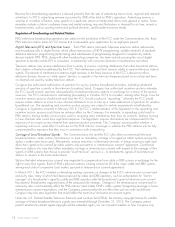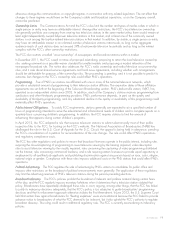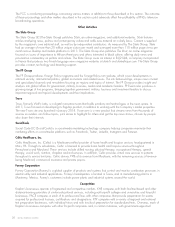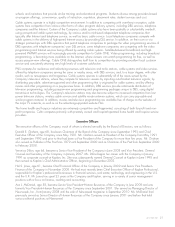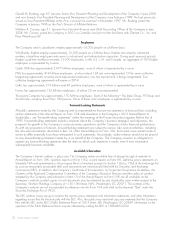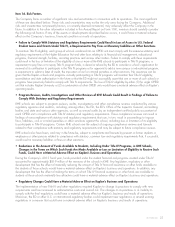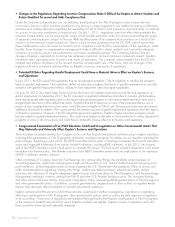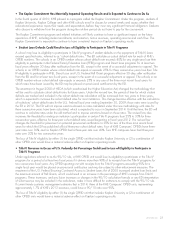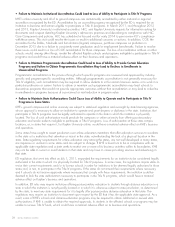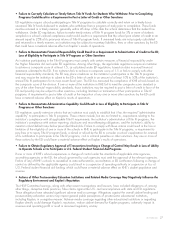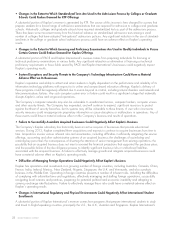Washington Post 2013 Annual Report Download - page 36
Download and view the complete annual report
Please find page 36 of the 2013 Washington Post annual report below. You can navigate through the pages in the report by either clicking on the pages listed below, or by using the keyword search tool below to find specific information within the annual report.Revenue from broadcasting operations is derived primarily from the sale of advertising time to local, regional and national
advertisers. In 2013, advertising revenue accounted for 86% of the total for PNS’s operations. Advertising revenue is
sensitive to a number of factors, some specific to a particular station or market and others more general in nature. Some
examples include a station’s audience share and market ranking; seasonal fluctuations in demand for air time; annual or
biannual events, such as sporting events and political elections; and broader economic trends.
Regulation of Broadcasting and Related Matters
PNS’s television broadcasting operations are subject to the jurisdiction of the FCC under the Communications Act. Each
PNS television station holds an FCC license that is renewable upon application for an eight-year period.
Digital Television (DTV) and Spectrum Issues. Each PNS station (and each full-power television station nationwide)
now broadcasts only in digital format, which allows transmission of HDTV programming, multiple channels of standard-
definition television programming (multicasting) and subchannels of programming designed for reception by mobile
devices (mobile DTV). PNS, along with other broadcasting companies, has been actively pursuing the use of digital
spectrum to provide mobile DTV to consumers, in partnership with consumer electronics manufacturers and others.
Television stations may receive interference from a variety of sources, including interference from other broadcast stations,
that is below a threshold established by the FCC. That interference could limit viewers’ ability to receive television stations’
signals. The amount of interference to stations might increase in the future because of the FCC’s decision to allow
electronic devices, known as “white space” devices, to operate in the television frequency band on an unlicensed basis
on channels not used by nearby television stations.
Congress has authorized reallocation of spectrum for use by wireless broadband providers, including substantial
amounts of spectrum currently in the television broadcast band. Congress has authorized incentive auctions whereby
the FCC would auction spectrum relinquished by broadcast television stations in exchange for a share of the auction
revenues. The FCC commenced a rulemaking proceeding in October 2012 to consider, among other things, how the
incentive auction process should work and how the FCC should conduct a “repacking,” whereby the FCC would
require certain stations to move to new channel allotments so as to free up a nationwide block of spectrum for wireless
broadband use. The repacking and incentive auction process are subject to certain requirements established by
Congress in legislation enacted in February 2012. The FCC’s implementation of this legislation in the repacking and
incentive auction process could have an adverse effect on the Company. For example, a repacking could result in
PNS stations having smaller service areas and/or receiving more interference than they do currently. Stations moving
to new channels also could incur significant expense. The legislation requires that stations be compensated for the
expenses of moving to a new channel from spectrum auction proceeds. The Company cannot predict whether a
repacking will occur, what effect it will have on the PNS stations’ coverage or whether the PNS stations will be fully
compensated for expenses that they incur in connection with a repacking.
Carriage of Local Broadcast Signals. The Communications Act and the FCC rules allow a commercial television
broadcast station, under certain circumstances, to insist on mandatory carriage of its signal on cable systems serving the
station’s market area (must carry). Alternatively, stations may elect, at three-year intervals, to forego must-carry rights and
allow their signals to be carried by cable systems only pursuant to a “retransmission consent” agreement. Commercial
television stations also may elect either mandatory carriage or retransmission consent with respect to the carriage of their
signals on DBS systems that choose to provide “local-into-local” service (i.e., to distribute the signals of local television
stations to viewers in the local market area).
Stations that elect retransmission consent may negotiate for compensation from cable or DBS systems in exchange for the
right to carry their signals. Each of PNS’s television stations is being carried on all of the major cable and DBS systems
serving each station’s respective local market, pursuant to retransmission consent agreements.
In March 2011, the FCC initiated a rulemaking seeking comments on changes to the FCC’s retransmission consent and
exclusivity rules, many of which had been proposed by cable and DBS operators, such as authorization for “interim
carriage” of a broadcaster’s signal by cable and DBS operators after the broadcaster’s grant of retransmission consent
has expired. Broadcasters opposed many of the proposed rule changes. Changes to the retransmission consent and/or
exclusivity rules could materially affect the PNS stations’ (and Cable ONE’s cable systems’) bargaining leverage in future
retransmission consent negotiations, and the Company cannot predict the net effect that such an order would have.
Congress may also pass legislation that would affect the must-carry/retransmission consent regime.
Under the U.S. Federal Satellite Television Extension and Localism Act (STELA), the statutory copyright license for satellite
carriage of distant broadcast television signals was extended through December 31, 2014. The Company cannot
predict whether this distant signal copyright will be extended again, nor can it predict whether or how Congress may
18 GRAHAM HOLDINGS COMPANY


